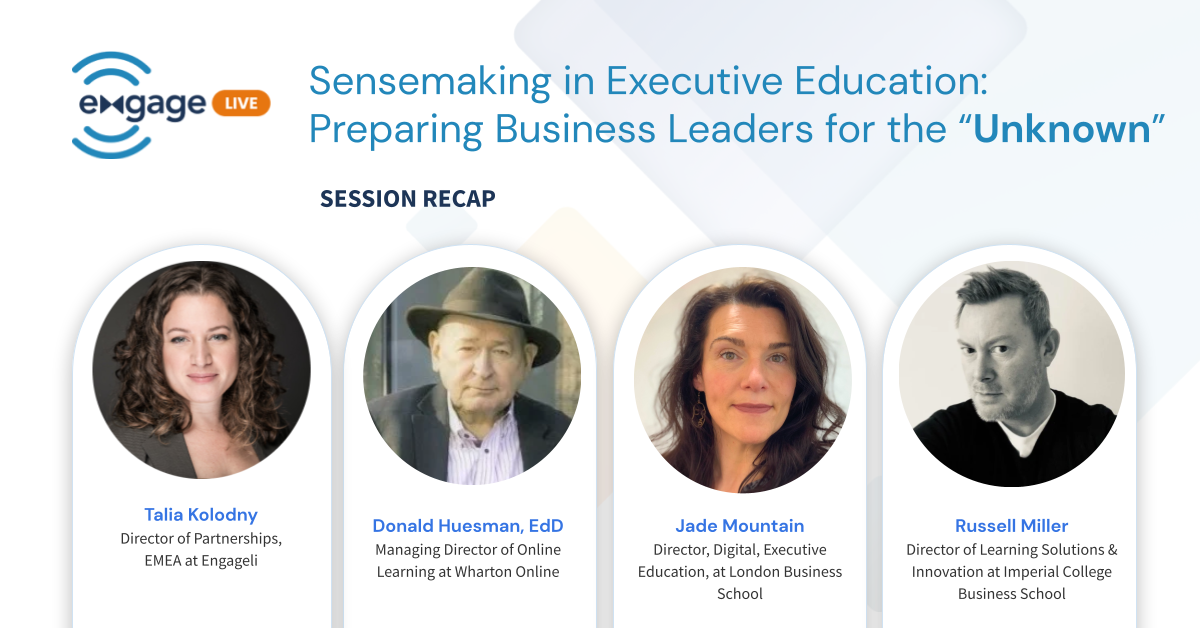Recently we held a virtual panel on Sensemaking in Executive Education: Preparing Business Leaders for the Unknown. Participants from more than 20 cities worldwide seeking inspiration, representing a variety of roles including academics, Learning Designers, Higher Education leaders, IT professionals and corporate executives, came together to explore how to design meaningful sense-making learning experiences while maintaining authenticity, as well as how to teach problem-solving to aid in the growth of business leaders. Below are a few highlights from the panel discussion, moderated by Jade Mountain, Director of Digital at London Business School.
“EngageLIVE” is a series of free, interactive sessions held on the Engageli platform. Unlike traditional webinars, EngageLIVE sessions include audience participation, table discussions, interactive polls and Q&A opportunities, bringing the insights, questions and experiences of the audience to life, combined with the knowledge and expertise of our guest speakers. If you’re interested in experiencing the full session, please explore our asynchronous Engageli playback room.
What is sensemaking and why does it matter?
Jade Mountain opened by providing her perspective on the topic and how it is understood at LBS, “Executives don’t have the luxury of being able to wait three years like undergraduates to use what they have learned and experienced to create impact. So there is this sense of immediacy – they need to extract personal meaning from what is in front of them now to enable them to make decisions about what they will face in the future.”
Jade also reviewed the three core components of learning:
-
-
- The what, the so what and the now what. The ‘what’ being research, experience, cases, knowledge and expertise.
- The ‘now what’ is the action, how I use what I just heard to make a difference in my own organization.
- But the sensemaking is in the ‘so what’, this is how the two other dots are connected.
-
Technology enables truly global and learner-centered classrooms
One advantage of the online environment is the ability to bring together individuals from diverse backgrounds to share ideas, work together at tables and bring their own context into the conversation. This way, executives can connect with the greatest minds while they are still embedded in their own communities. Russell Miller, Director of Learning Solutions & Innovation at Imperial College Business School, mentioned this has been one of the core attractors of programs at Imperial College. Russell noted, “Imperial is shifting from the “sage on the stage” approach to a learner-centered approach. The diversity of geographies, thinking styles, ages, experiences, go into a melting pot and offer a rich environment for solving business problems collaboratively. Participants leave our programs with a whole new perspective. Putting them at the heart of the learning process is the core of sensemaking at Imperial”.
The thirst for human connection doesn’t necessarily mean moving back to fully face-to-face
All of the panelists highlighted the growing need to meet and connect after a long period of distance and isolation. Donald Huesman, Managing Director of Online Learning at Wharton Online, shared that face-to-face programs at Wharton are now in demand more than ever. “We are mammals” said Don, “it is baked into our DNA to gather near the water hole.”
At the same time, a parallel shift has been the development of expertise and knowledge about technology-enhanced learning. Modern classrooms now offer blended opportunities, more flexibility and a diversity of participation options. Russell suggested that perhaps swinging back to only in-person is an over-correction that should be balanced with the valuable advancements we’ve seen in the last two years. Russell added, “Tech is a lot more accepted now. And we are learning how to use it effectively. People are moving away from replacing a face-to-face experiences with a parallel virtual one with video conferencing platforms. They are deepening their learning journeys with experimentation, preparation, flipped classrooms and flexible learning opportunities.”
The keys to success for executive education programs: humility, intentionality, diversity
When asked for their top tips, the panelists shared that they would prioritize intentional design and choice of technology and avoid retro-fitting content into new environments. Being intentional, designing for diversity, generating meaningful interactions and a variety of ways for individuals to express themselves - are the best ways to enable true sensemaking.
The focus on the shifting expectations of customers, executives and learners are also related to a level of humility we need in order to address their needs. As Don mentioned, the client now has the influence and they are demanding more flexible, online, asynchronous and blended education for their executives. “To do this right”, said Russell, “there is no perfect plan. A bit of chaos and dissent can be positive for this purpose.”
If you’re interested in participating in future EngageLIVE sessions like this one, contact us at events@engageli.com or visit: events.engageli.com

